Graham Reid | | 9 min read
When rock encyclopedias describe Steve Hackett along the lines of “former guitarist with the British progressive rock band Genesis” they do him a disservice.
Yes, Hackett was an integral member of the band between the Nursery Cryme album in '71 and Seconds Out ('77), the Peter Gabriel-into-Phil Collins years which most consider the band's finest period.
But look at that end date.
Hackett has been out of Genesis for four decades and although he still plays material from those years – keeping the spirit of the band alive when others don't or, in the case of Collins, have effectively retired – he also has a vast catalogue of albums under his own name.
They include broad concept or themed albums, some grounded in the blues, some acoustic and some kiss-the-sky electric and others in tribute to Bach (whose name comes up repeatedly in this conversation).
His most recent album The Night Siren – with a sitar player and Middle Eastern influences and instruments – squarely in the amorphous category of world music-cum-prog.
Behind The Night Siren is an over-arching concept of all music and, by extension, all people being equally deserving of respect. A timely message given the dark day of our free-wheeling conversation.
Britain has woken up to the terrorist bombing in Manchester.
Hackett – who brings a six-piece band to New Zealand in Juky (see poster) playing Genesis, Night Siren and solo material – is soberly considering that.
So our conversation begins on melancholy note when he says he and the band were in Stockholm the day after the attack there, and he knows well the Bataclan club in Paris where there was also a terror attack.
“You do stop and think, 'That's the price of it' but I am still not going to stop. One has to resort to cliches but it is sobering and makes you think of the divisive nature of religion, it doesn't seem it is a problem solver whether it is Islamic or Christian.
“I think of the Crusades and that was disaster number one.”
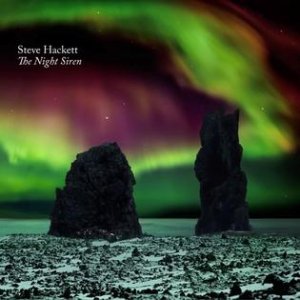 Hackett says he and his wife, the
author Jo Lehmann, are always talking about such issues and she wants
to get to the heart of these matters in her fiction. The broad
message however behind The Night Siren has never been more apposite.
Hackett says he and his wife, the
author Jo Lehmann, are always talking about such issues and she wants
to get to the heart of these matters in her fiction. The broad
message however behind The Night Siren has never been more apposite.
Hackett says the idea of a United Nations of Music is the dream, where musicians from all schools and cultures can come together without borders.
“The problem we live with today is that hypothesis is offered as certainty, and there's the rub”
It is in the nature of a conversation with Hackett that it becomes digressive as he pursues a tangential idea. He says he was having a conversation with Peter Gabriel recently about the afterlife (“and not just after Genesis!”) and how they both believe there is something beyond the grave.
He is on a personal on-going quest researching this on this by reading Elisabeth Kubler-Ross and various spiritualists.
That sounds like the making of an
excellent concept album?
“Oh yeah,” he laughs, “I've
occasionally delved into that sort of stuff.”
And in fact across his broad discography starting with his first solo album Voyage of the Acolyte in '75 when he was still a member of Genesis, he has touched on many ideas and musical styles.
“And we've just had a hit with The Night Siren. The Genesis stuff is more widely known but we've just had chart success in UK, Germany, Holland and for the first time in many years in Italy. Sales seem to be going up in a contracting marketplace.”
When the conversation turns to the broad ideas and array of musicians on the current album and in his band, Hackett digresses into a discussion of how lucky he has been to have encountered people like producer Ken Scott many years ago who engineered Beatles albums, worked with the Mahavishnu Orchestra and David Bowie – and drummer Billy Cobham whom he remembers listening avidly to with Phil Collins.
“I've been very lucky because I've worked with guys who have extraordinary skills. I've never given lessons to anybody and always feel I am standing in for this great master, and what we want is a combination of what Segovia could do, and what Jimi Hendrix could do.
“In a way the idea is of rock music as exemplified by Bach, and all classical musicians, rising to that same level of competence.
“In a way the idea the idea of Bach as the father of Western music and the greatest bass player alive, all of that – and these are things people have said over the years, including Jack Bruce.
“Then you've got the great black bluesmen . . . and you'd think these two types of music were never going to come together, but then they did in the late Sixties.
“So what's similar about those two types of music is the antiphonal approach, the question and response of the choir or orchestra, or whether it's the man standing there singing his heart out then responding with a guitar phrase. There are similarities. And the similarities are greater than the differences.
“The idea of taking away prejudice and having music that is full of surprises – what we now latterly call prog – just fitted the bill.
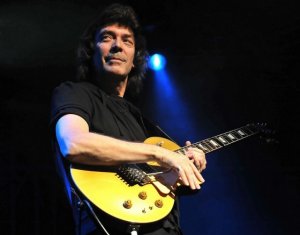 “It was music which built bridges and
everything was welcome in it, if you take the pan-genre approach then
there's no point in rejecting any musical genre or idea, they are all
useful.
“It was music which built bridges and
everything was welcome in it, if you take the pan-genre approach then
there's no point in rejecting any musical genre or idea, they are all
useful.
“It's like an effects pedal, there's no such thing as a useless one, it's just using it in the right way.”
He laughs about the myth that punk destroyed prog.
“No, prog never went away and it was the music punk tried to kill! I would never dream of trying to kill punk, in fact I bought the Sex Pistols first album and enjoyed it immensely and I felt it had something to say.
“I thought it was a joke,” he laughs.
“I thought it was very well done and you couldn't miss them. But the idea of using music in a militaristic way -- “my sword is sharper than your” – is bullshit. There is room for everything.
“I hold the opposite view, I think it's important to listen to music from all eras. I listen to modern bands and old bands and I listen to very old bands indeed. I've taken on board everything from Bix Beiderbecke to that young whippersnapper Glenn Miller!
“I'm prepared to cast an ear over everything but I find the music of Bach timeless or contemporary or whatever you want to call it. Musicians are always trying to get their heads and hands around that wonderful stuff.
“I'm also prepared to take on atonal music whether that is in jazz or wherever. I'm familiar with the works of Messiaen and the work of Bartok, which can be atonal but can also be extraordinarily beautiful.
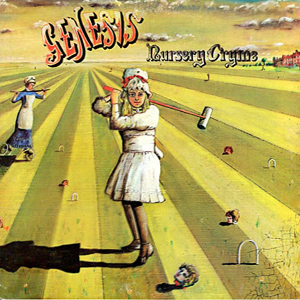 “I don't find enough musicians who
have got that in their music, but I find it interesting that in the
middle of something by Muse they will drift off into a piece of
Chopin and that 's exactly the spirit I like in music. It should be
able to take you by complete surprise, when you are least expecting
it.”
“I don't find enough musicians who
have got that in their music, but I find it interesting that in the
middle of something by Muse they will drift off into a piece of
Chopin and that 's exactly the spirit I like in music. It should be
able to take you by complete surprise, when you are least expecting
it.”
Hackett acknowledges that through playing the music of Genesis from the period he was in the band that he is keeping the spirit of the group in that period alive and vital. He also notes that with hindsight many believe Genesis were more successful than they actually were back in the early days, the Nursery Cryme album on which he first played was far from a hit.
“It was more of a struggle and the band was doing free concerts and playing clubs when I first joined. Nursery Cryme wasn't a hit in its day but became a hit over time. I think Genesis was a very slow burn which people picked up on latterly and, ironically, it was the early stuff which outsold the later stuff which was actually the more commercial.
“The early stuff like Selling England By The Pound is what people come back to time and time again, an album that John Lennon picked up on in '73 and said we were one of the bands he was listening to. But we were in America and could hardly get a gig anywhere.
“If we'd been able to tweet that at the time it might have transformed out fortunes.”
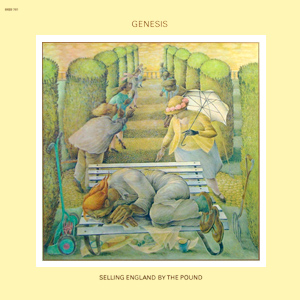 As time went on however the democratic
nature of the band – all songs getting full band credit – became
eroded so using the Beatles analogy, did he feel the George Harrison
in Genesis towards the end of his tenure?
As time went on however the democratic
nature of the band – all songs getting full band credit – became
eroded so using the Beatles analogy, did he feel the George Harrison
in Genesis towards the end of his tenure?
“I was not a founder member but it was more democratic when Peter Gabriel was the lead singer and he was very much interested in that. The band turned into something else over time but I am very proud of my creative input. The keys to the songwriting camp network were very closely guarded and sometimes you had to break in, or work outside the band.
“I was lucky enough to do my solo album Voyage of the Acolyte while I was still a member of the band and I think it took everyone unawares because it did very well and I proudly have a silver album for that.”
And, again with a Beatles' analogy, when he embarked on a solo career did he feel, like McCartney in Wings, he needed to put distance between himself and his former band to establish his own voice, only to realise he had written those songs so had every right to play them?
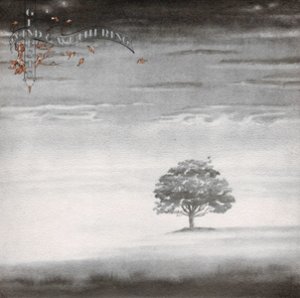 “Absolutely. You come to a point, as
in McCartney's case and he'd written Eleanor Rigby, that it's
important to acknowledge that glorious past and a song you fought
hard for back in the day, sometimes you have to fight hard for them
within the band and then sometimes playing them to audiences which
might not have acknowledged quite how strong the stuff was.
“Absolutely. You come to a point, as
in McCartney's case and he'd written Eleanor Rigby, that it's
important to acknowledge that glorious past and a song you fought
hard for back in the day, sometimes you have to fight hard for them
within the band and then sometimes playing them to audiences which
might not have acknowledged quite how strong the stuff was.
“I think I have every right to do that, and not just the songs I wrote.”
In his Genesis set he plays material written around the time of the Wind and Wuthering album but not released. And the band he carries can re-create the music in an authentic way, but still leave space for the spirit to take hold. When deeply involved in playing “I can have a visit from a superior entity which takes over and everything you go for comes off and you take greater and greater risks”.
And he has a very deep and wide well of musical ideas to draw on.
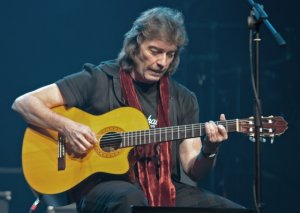 “I have a personal mandate that I
feel I was born to play and sometimes to go total immersion into
genres I am completely unfamiliar with and learn that language from
the ground up, whether it is working in Brazil with different
percussions on the album we did back then called Till We Have Faces
('84), or whether its working with a sitar player from Azerbaijan
like Malik Mansuroff, and working with the Hungarians [on The Night
Siren].
“I have a personal mandate that I
feel I was born to play and sometimes to go total immersion into
genres I am completely unfamiliar with and learn that language from
the ground up, whether it is working in Brazil with different
percussions on the album we did back then called Till We Have Faces
('84), or whether its working with a sitar player from Azerbaijan
like Malik Mansuroff, and working with the Hungarians [on The Night
Siren].
“Sometimes I work people who don't speak English that well so we have to invent another language, just to come to a musical agreement and often quite quickly.”
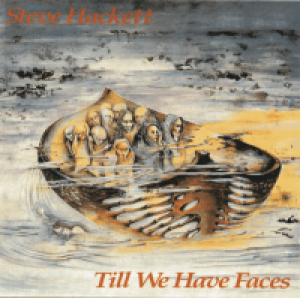 He talks about the approach of
Brazilian drummers: one man, one drum, one drumstick and how the idea
is to get as many different sounds with just that bare idea. Rock
musicians don't think like that but a jazz drummer can find dozens of
different sounds from a snare. This is an approach he applies to
guitar playing, how to extract as many musical ideas from the
instrument.
He talks about the approach of
Brazilian drummers: one man, one drum, one drumstick and how the idea
is to get as many different sounds with just that bare idea. Rock
musicians don't think like that but a jazz drummer can find dozens of
different sounds from a snare. This is an approach he applies to
guitar playing, how to extract as many musical ideas from the
instrument.
“If you treat the acoustic guitar like a drum you can get close to what flamenco players – the greatest rhythm guitarists on Earth – are capable of.”
What has been notable about 67-year old Hackett's long career is how productive he has been on record and how rarely he has taken time out. He's always been a player.
“Music is the oxygen I breathe and always feel renewed rather than exhausted by playing and recording. One lifetime is far too short to accomplish everything but I think many years ago I decided to sketch in as many styles as possible, sometimes do a full portrait, sometimes recording the Bach stuff I was very proud to have done that album Tribute which was all about the great composers in the main transcribed for guitar from other instruments like the Bach violin and cello
“But I also love blues and a lot of people don't get into because they don't think it is harmonically interesting. But that isn't the point, it's what you do within that.
“It also not really about technique either. It's always about something beyond that.”
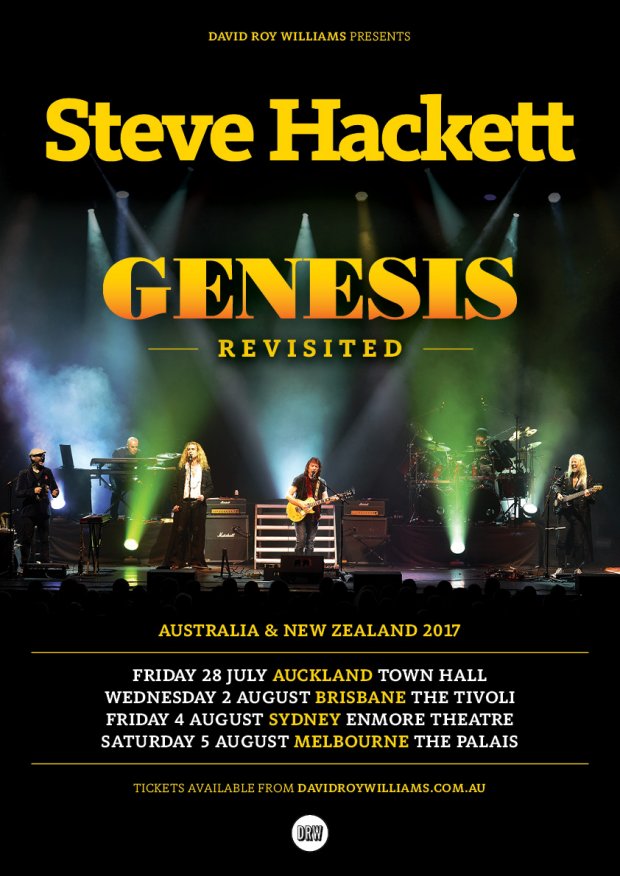

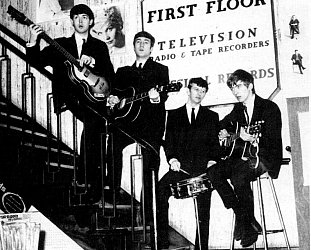
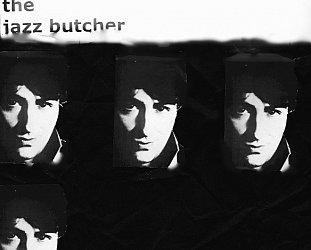
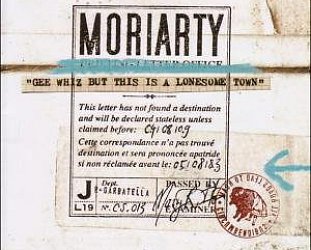
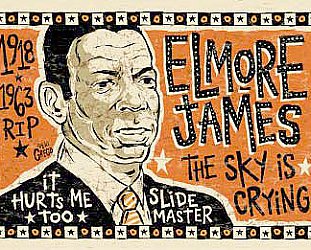
Phil - Jun 1, 2017
Nice Interview with Mr Hackett
SaveGraham H - Jun 1, 2017
Interesting Interview ..Covered all Bases i had those older Genesis Albums and loved them..Would be Great to see the Gig..(as a photographer )
SavePaul - Jul 24, 2017
Great interview. I was mid-teens in the mid/late 70's so managed to love all that early (up to Seconds Out) Genesis as well as the punk/new wave explosion. I can't wait for the gig! Will be going solo - somehow it doesn't seem music for sharing with people who don't already know it...:)
Savepost a comment